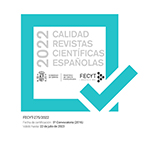Precarious Lifes and Vulnerable Bodies in María Reimóndez’s Cobiza (2021)
Abstract
Posthumanismand ecofeminism abandon the notion of representing a universal subject and question the phallogocentric and humanist paradigm of the symbolic order. Subjectivity becomes ex-centric, nomadic, animalistic (both personal and communal). Embodiment and performativity are seen as indispensable conditions that situate one's own experience in relation to the experience of others and in terms of a collective agency. This, in turn, allows for the redefinition of certain naturalised narratives in relation to agency, materiality, nature, gender and the body; those schools of thought focus on precarious and vulnerable lives, both human and non-human. Science fiction has become prominent in creating, rewriting and debating the theoretical and political positions mentioned above. Hence, the aim of this article is to analyse Cobiza (2021), María Reimóndez’s recent dystopian novel, in light of ecofeminism and posthumanism. It focuses also on the means by which the novel participates in the social and political production and reproduction of subjectivities marked by exclusion and estrangement, and embodied in the figures of pariahs and defectors.
Downloads
Article download
License
In order to support the global exchange of knowledge, the journal Madrygal. Revista de Estudios Gallegos is allowing unrestricted access to its content as from its publication in this electronic edition, and as such it is an open-access journal. The originals published in this journal are the property of the Complutense University of Madrid and any reproduction thereof in full or in part must cite the source. All content is distributed under a Creative Commons Attribution 4.0 use and distribution licence (CC BY 4.0). This circumstance must be expressly stated in these terms where necessary. You can view the summary and the complete legal text of the licence.








